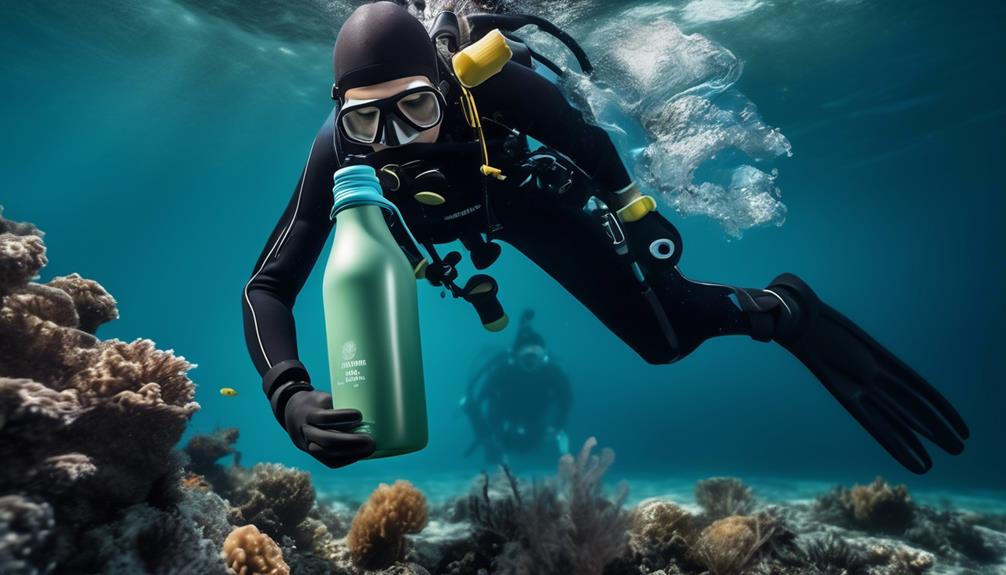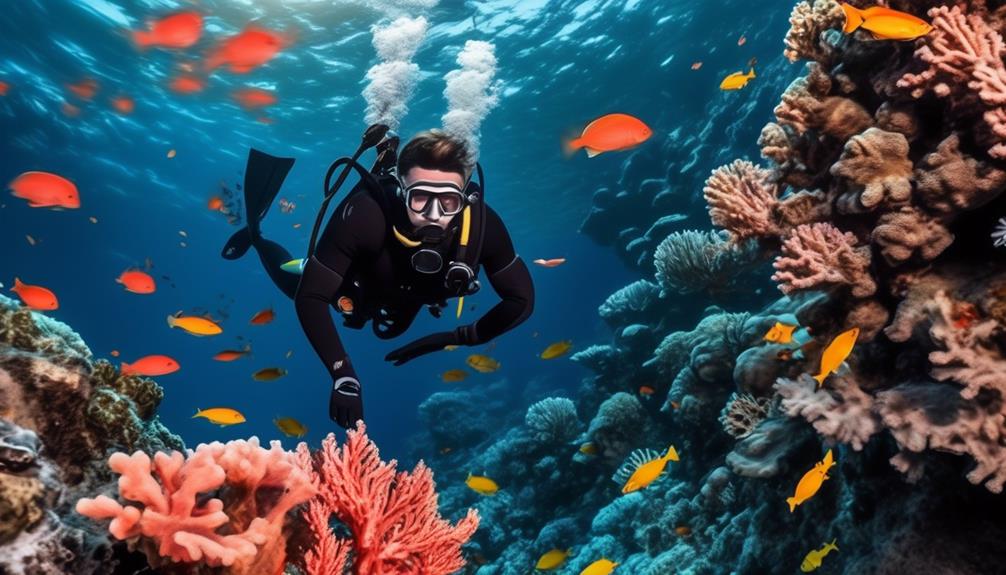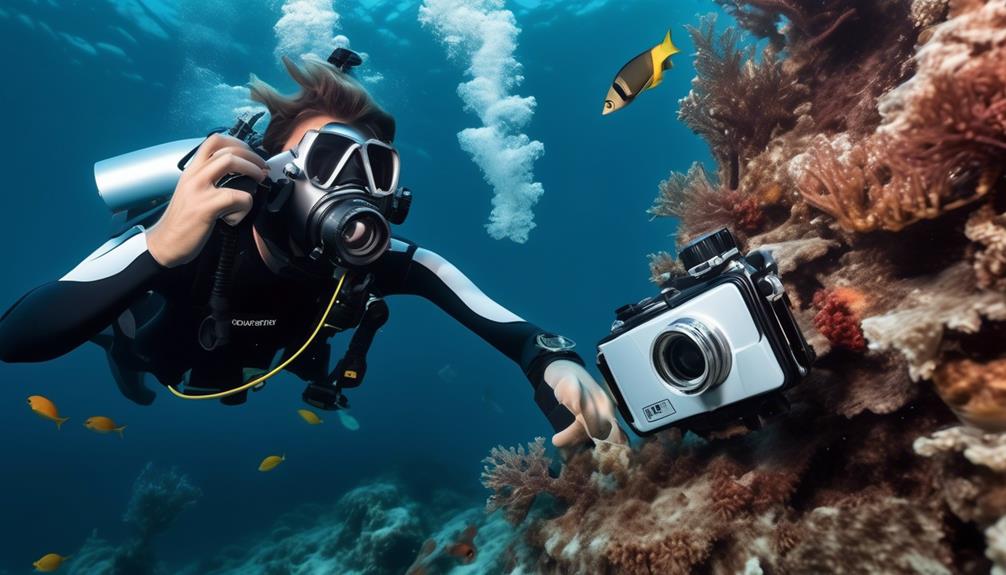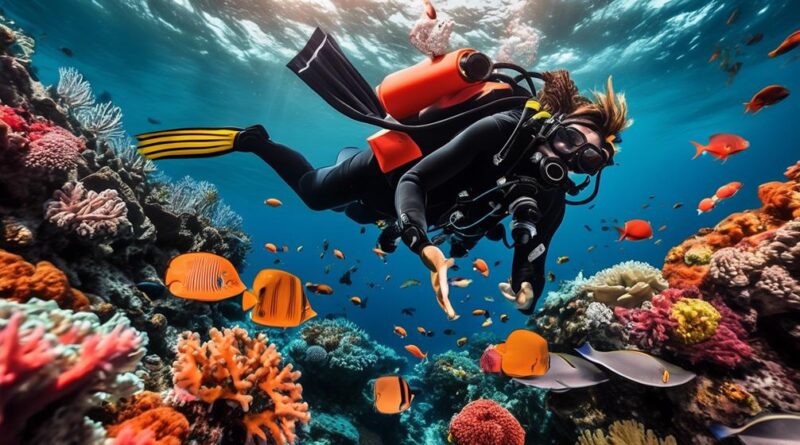Sustainable Practices for Responsible Underwater Diving
You know the old saying, 'Take nothing but pictures, leave nothing but footprints'? When it comes to underwater diving, this adage holds more weight than ever.
As an environmentally conscious diver, you strive to minimize your impact on the delicate underwater ecosystems you explore. But what are the specific sustainable practices that can make a real difference?
From choosing eco-friendly dive operators to promoting reef-safe sunscreen, there's a multitude of ways you can ensure your underwater adventures are not only exhilarating but also responsible and sustainable.
Choosing Eco-Friendly Dive Operators
When selecting a dive operator, prioritize those who actively promote and adhere to eco-friendly practices to minimize your impact on the underwater environment. Look for operators who offer sustainable transportation options, such as using electric or hybrid boats, to reduce carbon emissions. Additionally, eco-friendly dive certifications ensure that the dive operator follows environmentally responsible guidelines, so consider choosing operators who hold such certifications. By opting for operators with these eco-friendly practices, you contribute to the conservation of marine ecosystems.
Another crucial aspect to consider is the ethical seafood consumption practiced by dive operators. Some operators may include sustainable seafood options in their meal offerings, supporting responsible fishing practices and reducing the impact on marine life. It's essential to inquire about the source of the seafood provided during dive trips and choose operators that prioritize ethical and sustainable seafood choices.
Responsible waste disposal is also a significant factor when selecting an eco-friendly dive operator. Operators should have proper waste management systems in place to minimize their environmental footprint. Ask about their waste disposal practices, including recycling and proper disposal of hazardous materials. Opting for dive operators with robust waste disposal policies ensures that your diving experience has minimal impact on the delicate underwater ecosystems.
Using Reef-Safe Sunscreen
Consider using a mineral-based reef-safe sunscreen to protect both your skin and the delicate underwater ecosystems during your diving adventures. Coral friendly sunscreen plays a crucial role in minimizing the environmental impact of sun protection products on marine life. When you're diving, it's essential to prioritize safe sun protection methods that contribute to ocean conservation.
Conventional sunscreens often contain chemicals like oxybenzone and octinoxate, which have been found to harm coral reefs. These chemicals can contribute to coral bleaching, disrupt the growth and reproduction of marine life, and ultimately damage the delicate balance of underwater ecosystems. By opting for reef-safe sunscreen, you can actively reduce the negative impact on these vital marine environments.
Reef-safe sunscreens use mineral-based ingredients like zinc oxide and titanium dioxide, providing effective sun protection without posing a threat to coral reefs and marine life. When selecting a sunscreen for your diving trips, look for products labeled as 'reef-safe' or 'coral-friendly' to ensure that your sun protection aligns with the principles of ocean conservation.
Minimizing Single-Use Plastics

To reduce your environmental impact while diving, consciously minimize the use of single-use plastics. Reducing waste is crucial in preserving the delicate underwater ecosystems. When packing for your dive, opt for reusable water bottles instead of single-use plastic ones. There are many durable and lightweight options available that can withstand the rigors of diving. Additionally, consider using a refillable dive log instead of disposable underwater notebooks. These small changes can significantly decrease the amount of plastic waste generated during your diving trips.
Furthermore, seek out plastic alternatives for other diving essentials. For instance, instead of using single-use plastic bags for storing your gear, invest in silicone or mesh bags that can be reused countless times. These alternatives not only reduce plastic waste but also provide better protection for your equipment.
When it comes to food and snacks, choose items with minimal packaging or pack them in reusable containers to avoid single-use plastic wrappers and bags.
Participating in Marine Conservation Efforts
Engage in marine conservation efforts by actively participating in local clean-up events and supporting organizations dedicated to preserving underwater ecosystems. Volunteering opportunities are abundant for those who want to make a direct impact on marine life preservation.
By joining clean-up events organized by local diving centers or conservation groups, you can contribute to the removal of marine debris and help protect the delicate balance of underwater ecosystems.
Many organizations focused on marine conservation offer volunteering opportunities that allow you to get involved in various projects, such as coral reef restoration, sea turtle conservation, or monitoring and research initiatives. These experiences not only provide valuable assistance to ongoing conservation efforts but also offer you a chance to learn more about marine life and the challenges they face, directly from experts in the field.
Supporting organizations dedicated to marine conservation through donations or fundraising activities is another impactful way to contribute to marine life preservation. By backing these organizations, you help fund essential research, conservation projects, and educational programs, ultimately aiding in the protection of underwater ecosystems.
Respecting Marine Life and Habitats

When exploring underwater environments, always show respect for marine life and their habitats to minimize your impact and preserve the delicate ecosystems.
Ways to Respect Marine Life and Habitats
- Visit Marine Sanctuaries: When diving, consider visiting marine sanctuaries where marine life is protected. These areas are essential for the conservation of marine ecosystems and provide a safe space for marine life to thrive undisturbed. By visiting these sanctuaries, you contribute to their preservation and demonstrate ethical interaction with marine life.
- Support Coral Restoration Efforts: Engage in or support coral restoration initiatives. Coral reefs are vital habitats for countless marine species, and they're under immense threat from human activities and environmental changes. By participating in coral restoration projects, you actively contribute to the recovery and preservation of these crucial habitats. This is a meaningful way to practice sustainable tourism and leave a positive impact on the marine environment.
- Minimize Physical Contact: When diving, always maintain a respectful distance from marine life and avoid touching or disturbing their habitats. Your actions can have a significant impact on the well-being of marine organisms and their ecosystems. By minimizing physical contact, you show reverence for their natural behaviors and contribute to the overall preservation of these delicate environments.
Supporting Sustainable Dive Destinations
Exploring sustainable dive destinations allows you to extend your commitment to marine conservation beyond individual dives, contributing to the long-term preservation of marine ecosystems. When choosing a dive destination, consider the community engagement initiatives in place. Sustainable dive destinations often work closely with local communities, supporting their livelihoods and involving them in conservation efforts. By visiting these destinations, you actively support and contribute to the well-being of these communities.
Furthermore, sustainable dive destinations prioritize minimizing their environmental impact. They implement responsible waste management systems, promote the use of eco-friendly products, and support marine conservation projects. By choosing to dive at these locations, you directly contribute to the preservation of the underwater environment. Additionally, these destinations often provide educational opportunities for divers, enhancing awareness about marine conservation and sustainable practices.
Supporting sustainable dive destinations not only benefits the marine environment but also fosters positive relationships with local communities. Your choice to dive at these destinations supports the livelihoods of the people who depend on the marine ecosystem. It also encourages the continuation of sustainable practices within the diving industry, ensuring that future generations can continue to enjoy the beauty of the underwater world.
Practicing Responsible Underwater Photography

To capture stunning underwater images responsibly, ensure that your photography equipment complies with environmental guidelines and doesn't disturb marine life. When engaging in underwater photography, it's crucial to consider the environmental impact of your actions. Here are some essential tips to practice responsible underwater photography:
- Ethical Composition
When framing your shots, be mindful of the marine environment and the creatures within it. Avoid touching or disturbing marine life for the sake of a photograph. Instead, focus on capturing the natural behavior of the animals without causing any disruption. Respect the underwater ecosystem and refrain from moving or manipulating any elements within it for the sole purpose of photography.
- Environmental Impact
Choose photography equipment that's designed to minimize environmental impact. For instance, opt for reef-safe sunscreen to protect both your skin and the marine environment. Additionally, be cautious with your diving and photography gear to avoid damaging delicate corals or stirring up sediment that can harm marine life.
- Considerate Behavior
Practice considerate behavior towards other divers and the underwater environment. Be mindful of your movements and the space you occupy to prevent accidental damage to coral reefs or other fragile underwater structures. By maintaining a respectful distance and using non-intrusive photography techniques, you can capture incredible images without disrupting the natural underwater world.
Promoting Eco-Friendly Dive Gear and Equipment
Consider promoting eco-friendly dive gear and equipment to minimize your environmental impact while exploring the underwater world.
When it comes to eco-friendly dive gear, one key item to consider is eco-friendly wetsuits. These wetsuits are typically made from sustainable materials such as limestone-based neoprene or recycled materials, reducing the reliance on non-renewable resources and minimizing waste. By opting for eco-friendly wetsuits, you can significantly decrease your carbon footprint and support the sustainable use of resources.
Another essential piece of eco-friendly dive gear to promote is sustainable dive lights. Traditional dive lights often use disposable batteries that contribute to environmental pollution. However, sustainable dive lights are designed to be rechargeable, reducing the number of disposable batteries ending up in landfills or oceans. Furthermore, some sustainable dive lights are crafted from recycled materials, further lessening the environmental impact of their production.
Frequently Asked Questions
How Can Divers Contribute to Scientific Research and Data Collection During Their Dives?
You can contribute to scientific research and data collection during your dives by participating in citizen science projects and collaborating with researchers. Your involvement helps to provide valuable data and make a scientific contribution.
What Are Some Alternative Transportation Options for Reaching Dive Destinations in Order to Reduce Carbon Emissions?
When reaching dive destinations, consider eco-friendly transportation like carpooling, public transit, or biking to reduce carbon emissions. Support dive destination sustainability by choosing transportation options that align with responsible environmental practices.
Are There Any Specific Regulations or Guidelines for Interacting With Marine Life and Habitats That Divers Should Be Aware Of?
When diving, always follow marine conservation guidelines for ethical interactions with marine life and habitats. It's crucial to respect the environment and adhere to regulations to ensure the protection and preservation of underwater ecosystems.
What Are Some Ways That Divers Can Support Local Communities and Economies in Sustainable Dive Destinations?
When diving, support local economies by engaging with communities and responsibly spending. Promote ethical tourism by patronizing local businesses and participating in community initiatives. Your actions can help sustain and uplift dive destinations.
How Can Divers Advocate for Sustainable Practices and Conservation Efforts Within the Diving Industry?
Advocate for sustainable practices and conservation efforts within the diving industry by supporting advocacy initiatives and forming conservation partnerships. Engage in community outreach, promote eco-friendly diving practices, and collaborate with local organizations.
Conclusion
So, next time you go diving, remember to:
- Choose eco-friendly operators
- Use reef-safe sunscreen
- Minimize single-use plastics
- Participate in marine conservation efforts
- Respect marine life and habitats
- Support sustainable dive destinations
- Practice responsible underwater photography
- Promote eco-friendly dive gear.
By adopting these sustainable practices, you can enjoy the beauty of the underwater world while also protecting it for future generations to come.
Happy diving!
